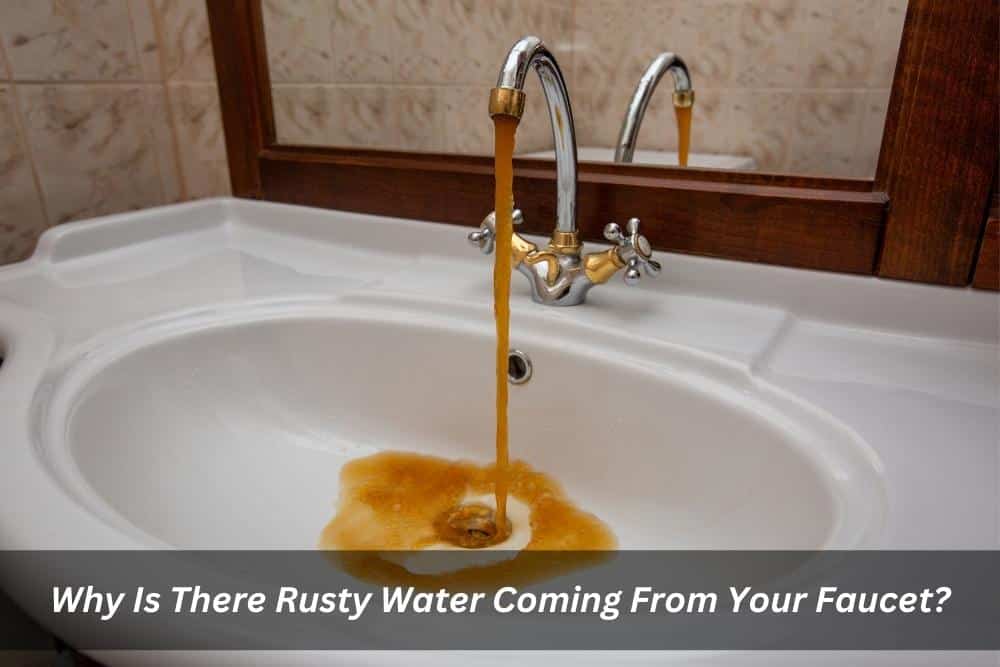If you’ve ever turned on your faucet and been greeted with a disconcerting stream of rusty water, you’re not alone. Rusty water can be an alarming sight, and it’s essential to understand why it happens, whether it’s safe, and how to address the issue. In this article, we’ll explore the signs and causes of rusty water, its safety, and practical steps to fix and prevent it. We’ll also discuss the benefits of using water filters and how to choose, install, and maintain them.
What are the signs of rusty water?
Before delving into the causes and solutions, let’s identify the signs of rusty water. Rusty water typically exhibits the following characteristics:
- Discoloured water – The most apparent sign is a change in the colour of your tap water. It may appear brown, orange, or even reddish in hue. This discolouration can be sporadic or constant, and it might be more noticeable when you first turn on the tap after it’s been unused for a while.
- Sediment or particles – In addition to the change in colour, you may notice small particles or sediment in the water. This can give your water a cloudy or gritty appearance.
- Metallic taste or odour – Rusty water can often have a metallic taste or smell. This can be unpleasant and make your water less appealing for drinking and cooking.
- Stains on fixtures and laundry – When rusty water flows through your plumbing system, it can leave behind unsightly stains on sinks, toilets, and laundry. These stains are not only aesthetically displeasing but can also be challenging to remove.
What are the causes of rusty water?
Understanding the causes of rusty water coming out from your faucet is crucial in addressing the issue effectively. Several factors can contribute to this problem:
- Corroded pipes – Corroded or deteriorating pipes are a leading cause of rusty water and can also cause tap water to taste or smell funny. Over time, metal pipes may develop rust on the inside, particularly if they are aging or constructed from materials like iron or steel. As water passes through these corroded pipes, it can pick up rust particles, which, in turn, can cause tap water to taste or smell unusual.
- Mineral buildup – Minerals, such as iron and manganese, naturally occur in groundwater. When these minerals accumulate in your plumbing system, they can lead to rusty water. This buildup may occur in pipes, water heaters, or water treatment equipment.
- Water main disturbances – Sometimes, rusty water can be the result of work or disturbances in your municipal water supply system. When water mains are repaired or flushed, they can stir up sediment and rust from the pipes, affecting your home’s water quality temporarily.
- Well water issues – If you have a well as your water source, the presence of iron, manganese, or other minerals in the groundwater can lead to rusty water. Well systems might also have water treatment components that can introduce rust into your water supply if not properly maintained.
- Seasonal variation – In some cases, rusty water may be more prevalent during specific seasons, such as spring or fall. This is often due to changes in temperature and water flow patterns that affect the distribution of minerals and sediment in your plumbing.
Is rusty water safe to drink?
While rusty water can be alarming, it’s generally not considered a health hazard. The rusty discolouration is caused by iron or other minerals, which are typically not harmful when consumed in small quantities. However, it’s essential to exercise caution and not drink large quantities of rusty water, as it can affect the taste and quality of your drinking water.
The primary concern with rusty water is aesthetic and practical. It can stain clothing, fixtures, and appliances, and the metallic taste might make it unpalatable for drinking and cooking. If you notice a persistent issue with rusty water, it’s advisable to address it for these reasons.
How to fix rusty water from the faucet
If you’re dealing with rusty water, there are several steps you can take to address the issue:
- Flush your plumbing system – Start by flushing your plumbing system. Run cold water through all your faucets for several minutes to help remove any loose rust or sediment. This can often clear up the issue if it’s caused by minor disturbances in your water supply.
- Inspect and replace old pipes – If you have an older plumbing system, consider inspecting your pipes for signs of corrosion. In severe cases, you may need to replace corroded pipes. This is a job best left to a professional plumber.
- Install a water softener or filter – To prevent further issues with rusty water, consider installing a water softener or filter. Water softeners can help remove minerals like iron and manganese, while filters can catch rust particles. Consult a water treatment specialist to determine the best system for your needs.
- Regular maintenance – If you have well water, ensure that your well and water treatment equipment are properly maintained. Regular inspections and maintenance can help prevent mineral buildup and rusty water issues.
- Contact your water provider – If you suspect that the issue is related to your municipal water supply, contact your water provider for information and assistance. They can inform you about any planned maintenance or water main work that might be causing the problem.
How to prevent rusty water from the faucet
Preventing rusty water is often more manageable than dealing with it after it occurs. Here are some preventive measures:
- Regular plumbing inspections – Schedule regular plumbing inspections to catch corrosion and other issues early. Professional plumbers can assess the condition of your pipes and recommend necessary repairs or replacements.
- Water treatment equipment – Deliberate the wise choice of investing in water treatment equipment, including water softeners and filters, as these systems align with the Australian drinking water guidelines. They effectively eliminate minerals and sediment from your water, significantly decreasing the risk of encountering rusty water issues.
- Flushing your system – If you notice discoloured water after a period of inactivity, like returning from vacation, flush your plumbing system by running the taps for a few minutes. This can help clear any settled sediment before you use the water for cooking or drinking.
- Regular well maintenance – If you have a well, stay on top of maintenance. Regularly check and maintain your well pump and filtration system to prevent rust and mineral buildup.
Should you use a water filter?
Using a water filter is a practical solution for addressing rusty water issues. Water filters are designed to remove contaminants, including rust particles and minerals like iron and manganese. However, the effectiveness of a filter depends on the type of filter you choose and how well it’s maintained.
How to choose the best water filters
When selecting a water filter for rusty water, consider the following factors:
- Filter type – Choose a filter specifically designed to address the issues associated with rusty water. Common options include sediment filters, activated carbon filters, and reverse osmosis systems.
- Micron rating – The micron rating indicates the size of particles a filter can capture. For rusty water, a filter with a lower micron rating (1-5 microns) is ideal, as it can capture even small rust particles.
- Flow rate – Consider the flow rate of the filter. A higher flow rate is essential for maintaining adequate water pressure in your home. Ensure the filter can handle your household’s water demand.
- Filter lifespan – Check the filter’s lifespan and replacement frequency. Some filters may require more frequent replacement when dealing with rusty water, so factor in ongoing maintenance costs.
- Certifications – Look for filters with relevant certifications to ensure they effectively remove contaminants.
How often should you replace a water filter cartridge?
The frequency of water filter cartridge replacement depends on several factors, including the filter type, water quality, and usage. Here are some general guidelines:
- Sediment filters – If you’re using a sediment filter for rusty water, you may need to replace the cartridge every 3 to 6 months, or more frequently if you notice a significant reduction in water quality.
- Activated carbon filters – Activated carbon filters typically need replacement every 6 to 12 months. However, if you notice a change in taste or odour, consider replacing it sooner.
- Reverse osmosis systems – It usually has a longer lifespan, with replacement needed every 2 to 3 years. Be sure to follow the manufacturer’s recommendations.
Regularly monitoring the filter’s performance and following the manufacturer’s guidelines for replacement will ensure that your filter continues to provide clean and clear water.
Conclusion
Rusty water coming from your faucet can be a concerning issue, but it’s typically not a health hazard. It’s crucial to understand the causes of rusty water, how to address it when it occurs, and how to prevent it in the future. Using water filters is an effective way to improve water quality and eliminate rusty water. By choosing the right filter, installing it correctly, and maintaining it, you can enjoy clean and clear water from your faucet, free from the unwanted effects of rust and minerals. Don’t let rusty water ruin the quality of your water; take the necessary steps to ensure your taps flow with clean, refreshing water.
If you’re dealing with the persistent issue of rusty water in your home, it’s time to call Apex Plumbing Solutions. Our experienced team of plumbing experts understands the causes and solutions for rusty water, and we’re here to help. Whether you need a thorough inspection of your plumbing system, professional pipe replacement, or the installation of effective water treatment solutions like filters, our skilled technicians have you covered. Say goodbye to the hassle of rusty water, and hello to clean, clear, and safe water from your faucets. Contact Apex Plumbing Solutions today, and let us bring back the quality of your water supply.


